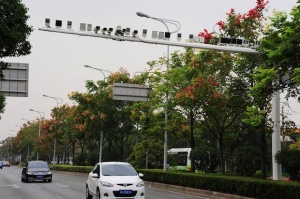Difference between revisions of "Privacy in the China"
| Line 13: | Line 13: | ||
When the internet first came to China in 1994, it was not strictly regulated. This was also the result of China's "Open Door Policy", which hoped to introduce more Western knowledge to reform the Chinese economy. However, as the popularity of internets grew, the former leader of China, Deng Xiaoping had concerns about the security of the country. In 2000, the Golden Shield Project was implemented, which is the precursor to the "Great Firewall". In 2018, the Chinese government employs over 50,000 people to enforce its censorship, including blocking websites, searching for disapproved information, and blocking personal accounts. | When the internet first came to China in 1994, it was not strictly regulated. This was also the result of China's "Open Door Policy", which hoped to introduce more Western knowledge to reform the Chinese economy. However, as the popularity of internets grew, the former leader of China, Deng Xiaoping had concerns about the security of the country. In 2000, the Golden Shield Project was implemented, which is the precursor to the "Great Firewall". In 2018, the Chinese government employs over 50,000 people to enforce its censorship, including blocking websites, searching for disapproved information, and blocking personal accounts. | ||
| − | + | In recent years, the government institutions in China have started to apply more advanced informational technologies, such as machine learning and artificial intelligence, to more efficiently carry out its censorship and better regulate social behaviors. | |
==Traffic camera with computer vision technology== | ==Traffic camera with computer vision technology== | ||
Revision as of 18:29, 27 March 2020
In China, privacy means the information that is unrelated to any public benefit or any group interest; it’s the concealed personal information that an individual or a group feels unwilling or inconvenient to share with others. Privacy protection is a natural human right of each individual.
In March 2001, the Chinese Supreme People's Court has announced the privacy protection law in the judicial interpretation. However, this privacy protection law didn't explain the conceptional difference between privacy and privacy law. It only emphasized "disobeying the public common interest, public morality, or invading others' privacy" but didn't explain whether the victim share receives protection when there's a conflict between the victim's privacy and the public common interest.
Contents
Challenges in privacy protection
The development of informational technologies and the internet has brought new concerns about privacy protection. According to a media survey in China, in recent years, 55.8% of participants considered the protection their privacy had become harder than previous, 29.3% of them think their private information is revealed to the public "casually".
As technology advanced, many means of privacy protection has emerged. For example, emails can now be encrypted via PGP and be anonymously sent through networks like I2P. Tor can also be used to prevent internet service providers from knowing who their clients are communicating with. Hypertext Transfer Protocol Secure (HTTPS) is an extension of the Hypertext Transfer Protocol (HTTP). It's used for more secure encrypted communication over a computer network, and it's widely used on the internet since recent years. Currently, most websites in China have not adopted HTTPS.
The great firewall
When the internet first came to China in 1994, it was not strictly regulated. This was also the result of China's "Open Door Policy", which hoped to introduce more Western knowledge to reform the Chinese economy. However, as the popularity of internets grew, the former leader of China, Deng Xiaoping had concerns about the security of the country. In 2000, the Golden Shield Project was implemented, which is the precursor to the "Great Firewall". In 2018, the Chinese government employs over 50,000 people to enforce its censorship, including blocking websites, searching for disapproved information, and blocking personal accounts.
In recent years, the government institutions in China have started to apply more advanced informational technologies, such as machine learning and artificial intelligence, to more efficiently carry out its censorship and better regulate social behaviors.
Traffic camera with computer vision technology
Computer vision is the technology that deals with how computers can understand images and videos from high-level. Furthermore, it means computers can substitute human to find and track the matched target in images or videos.
In China, computer vision has been applied in the traffic camera system, to better regulate and control the traffic. This new type of camera system can not only recognize people in the car (mainly used for capturing criminals) but also tell whether the driver is using a cellphone or not wearing a seatbelt, etc. Undeniably, in most cases, this new type of camera system can better regulate the traffic, fewer people break traffic rules, and it would definitely help the police better maintaining the social order. However, every coin has two sides, and nowadays, those traffic cameras are so widely used that each intersection has one of them, and people have very limited privacy while sitting in the car.
Camera system in school
In 2018, some high schools in China have started to apply computer vision technology in their camera system, for security and to better regulate the students' behavior. Those cameras are deployed in each corridor and each classroom, to find out students' absence and to supervise each class. According to Guo Yuzhuo, a high school biology teacher in Beijing, the system is able to scan through the facial expressions of all students in the classroom and tell whether they are paying attention or doing any other unrelated stuff. After the class, the system generates a report for each individual in the classroom, so she knows how the students spend their time in the 45 minutes.
So far, this type of technology is still in the experimental stage, but consider there's a potential that this type of technology could be applied in other fields, not just the school, but all corners of people's daily life, then there's no privacy ever after.
Machine learning for speech regulation
In China, the constitution law confirms that each individual has the freedom of speech, but meanwhile, it states, "while the people exercise this freedom, they can't cause any public chaos, they can't break any laws or cause damages to the society and the country".
In order to better regulate the speech on the internet and protect the social order, the Chinese government has widely used machines to surveil people's behaviors, all data on every website server, and every published speech and article. By doing so, the internet speed in China is severely slowed down, since the surveillance algorithm is currently running everywhere in China. But most importantly, the people in China has completely lost their privacy on the internet because all behaviors through the Chinese DNS are censored. On September 9th, 2013, the Chinese Supreme People's Court has announced a new law that, if the online information is used to slander others, and it's clicked or viewed for more than 5,000 times, or reposted for more than 500 times, it shall be considered a defamation crime.
See Also
References


